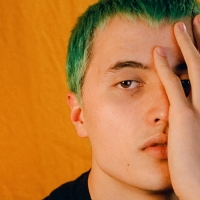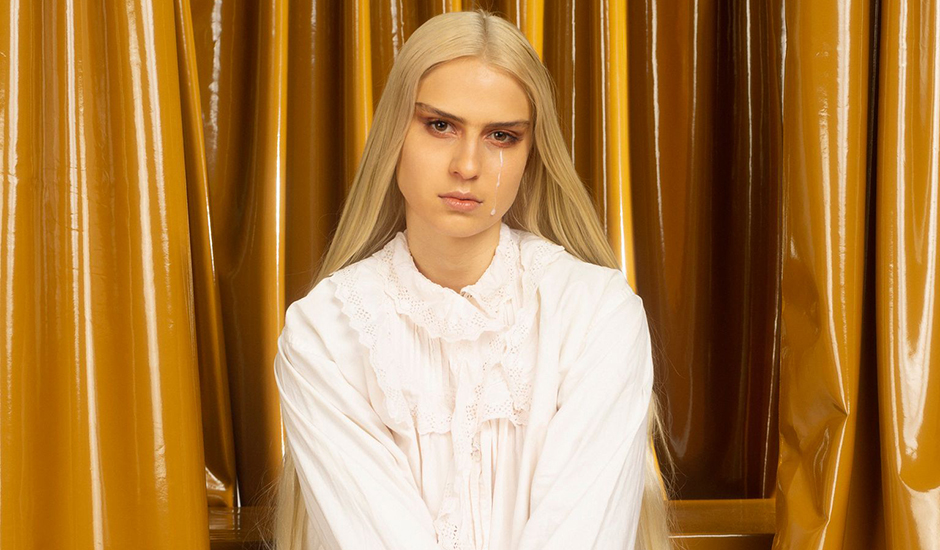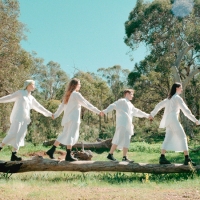 Listen to PRINCESS, an powerfully heartfelt return from Sydney's Nick WardAfter a captivating introduction last year, Nick Ward welcomes personal and musical evolution with his first single since his debut EP.
Listen to PRINCESS, an powerfully heartfelt return from Sydney's Nick WardAfter a captivating introduction last year, Nick Ward welcomes personal and musical evolution with his first single since his debut EP.

Album Walkthrough: Banoffee breaks down the intimacy of her new album, Tear Tracks
Nearly two years after the release of her invigorating debut album, the Melbourne musician returns with an intimate and detailed reflection of her life.
Header image by Phebe Schmidt.
This time two years ago, Banoffee was reaching a newfound peak. She was touring internationally alongside Charli XCX and collaborating alongside trailblazers such as SOPHIE and Empress Of, both of which featuring on her debut album Look At Us Now Dad - which arrived in January 2020. The Melbourne-based musician who positioned as a primed new addition to the world's off-kilter pop market; a long-time favourite of the Australian pop underground now spreading her wings internationally, and drawing acclaim of the highest echelon in the process of doing so.
In the time since Look At Us Now Dad's arrival, however, things have proved turbulent. Touring Look At Us Now Dad's forward-thinking pop experimentalism was reduced to a near-nothing, and as the world battled through the rollercoastering valleys of a global pandemic, Banoffee was encountering more personal and intimate issues, including a relationship's end. Now, she emerges on the other side of this time with Tear Tracks, a dizzyingly potent sophomore record that encapsulates Banoffee's emotionally intense past two years.
"Tear Tracks is a linear record of a deep suffering during lockdown in Australia. It's a breakup album but also a body of work that mourns the loss of my old life, lost friends and indulges in the deep depression that came with those things," she says on the record, which arrives this week. "This record only could have come after 2020 and 2019, because it really is about a very specific period of my life that swallowed me in. There's no longterm songs in there about anything from the past or hope for the future. It’s about this one event - this is how I feel."
As suggested, Tear Tracks is a devastatingly beautiful listen. Songs including the album-opening Tapioaca Cheeks explore the complexities of a long-winding relationship's end, while other tracks - including I Hate It - draw in similar themes from different points of view, as Banoffee layers deeper meanings into the intricacies of her sound. Elsewhere, there are moments like Idiot - a reflection of Banoffee at her self-destructive lowest - and Take A Pill, which provides an honest look into her past addiction to pharmaceutical drugs.
However, as deeply intimate and renowned Banoffee's songwriting is throughout Tear Tracks, it's an album that doesn't sonically wallow in its emotive qualities. Instead, it's an album that translates these low points into trailblazing and boundary-pushing pop music, channelling the intense emotions into heralding bursts of brilliance that encapsulate the musician's continued evolution and experimentation in the wake of Look At Us Now Dad two years prior. Sure, there are no tracks with the eccentric vigor of the Cupcakke-assisted Ripe (from her first album), but Tear Tracks welcomes moments just as daring, as Banoffee pushes her musical limits into areas they've never before reached.
In the end, Tear Tracks is a deeply personal and enchanting listen, one that captures a musician channelling her lowest moments into her highest artistic glory - showcasing the tremendous strength taken to do so, as you can hear intertwined within the album's fibres. "Tear Tracks is for people who just want to stay indoors and aren't really willing to try and be picked up yet," she concludes. "I want people to cry in the car listening to this, driving at night, in the shower — I want someone to think ‘I want to feel sad, I’m gonna put on Tear Tracks'."
It's an incredible listen, and you can dive into it below, alongside a track by track walkthrough from Banoffee as she breaks down the album's intense themes and creation one song at a time:
Tapioca Cheeks:
I remember writing this one well. It was at the beginning of 2020 just before covid hit. I can almost smell the canyon air and that buzzy feeling in my chest comes back. I’d just released my album Look At Us Now Dad and I felt like everything was falling into place.
I went to a house where Planet 1999 were working. Tapioca Cheeks came very quickly, they played me the chords they had and I sat on the couch with my phone writing lyrics into notes. “I like it when you cry” was the first lyric to come as I’d had a devastating argument with my partner at the time and seen them in a new light the night before. Watching someone fall to pieces in front of you can help you to see how they’re put together. This song came so quickly because it was just everything I was feeling that morning. I woke to find someone I loved tear-stained, holding me coffee and wishing me luck. Tapioca Cheeks is like a celebration of that moment when you think “oh fuck I’m in”. That lack of choice when you fall deeply for someone that anything just strengthens the feeling.
Enough:
I was in Fallback studios in Ascot Vale when I wrote this track. It was raining outside and I sat on the couch with a little nylon string and wrote it like a folk song. The original version has an acapella intro which only I ever liked, and no chords in the chorus. I sent it to Charles pretty soon after writing it because I was having a hard time listening to the truths I wrote. This song is special to me, it’s written almost exactly a year after Tapioca Cheeks and with not only a change in heart but so much had happened between these two songs.
I’ve always believed that if you love or want something enough you can move mountains to make it work, this song is about when that’s not the case. That realisation that wait - one of you doesn’t want to fix it or isn’t willing to believe. “Just tell me to shut up, come home” is a line I still think about. When you say to someone “you don’t want this” and they say nothing. YOUCH. Enough is about that moment.
Never Get To Fuck Any1:
“I don’t wanna go to the place where every freckle on your face is another gateway” - this song is about being frozen. In grief, in memories, in loss. I wrote it quite recently compared to the other tracks. Perto, Trashar, Marcus Thaine and I were in the studio and we’d just finished up for the day when we realised Trashar’s fried chicken hadn’t arrived! As we waited for it Perto played me this instrumental and I jotted down these lyrics. I think it was so easy because a) the production was damn good, but also because I was feeling so good that day that I was disconnected enough from any of my darkness that I could see it very objectively.
“I’ll never get to fuck anyone, the way I know how to with you” it’s pretty self explanatory. When something ends you feel the loss of them, but you’re also like - dam. Now I have to start from scratch with another body. I have to let someone get to know me, for me to know them. Fuck that. Haha
Tears:
“I wanna see you smile like you used to”.
This is my closing track. The track that sort of sums up the record and leaves with a hug. For me, this song is the most important on the record. It’s the one that reminds me that everything is okay. People can love each other forever without it being a love that brings them together. This song is for the people I’ve lost. The people I’ve deceived. The people who’ve deceived me. I think forgiveness and kindness always win, just like forcing yourself to go for a run in the morning.
I wrote this song in a cabin by the water on the great ocean road. I was alone and trying to find ways to sit with the things I was fighting to avoid. Sitting in the little cabin alone left me completely useless against what felt like a monster of grief and anxiety. As I sat and wrote this song, I knew that forgiveness was my only way to win. That acknowledgement of the damage I can cause was important, that being stubborn was actually feeding the monster. This track is a relief to me, it’s like “okay I’ve let go”. It releases anyone from guilt, and also accepts responsibility. It’s the other side to Tapioca Cheeks. A year later and with many many tear tracks before it, this song sang to the girl who wrote Tapioca Cheeks and let her go.
Something Great:
“I would never lie to you, I will tell you straight, we had something great”. This song sort of celebrates the good I had in a relationship, whilst acknowledging just how fucked the loneliness can feel. Those moments when you wake up and for a second you don’t remember what’s happened. Those gasps in the night when you cry in the dark. Those things for me are all quite beautiful. Sadness slows the world down. Everything blurs and you’re left with the heaviness of things that once felt light with their speed.
I love this song because it was there for me when I needed it. Now that I am looking back on this time, I know this song was like a friend to me that reminded me of why the grief was worth it. If you can have something great, then the cost is often to feel the opposite at some point. This song is a serenade to those that need to remember that grief and ecstasy always follow each other and that it’s okay to be grateful for something and resent it at the same time.
Money:
"I’m like an ankle weight, drag me around all of your days, you're driving down on the freeway crying on the hands free”. I sing this song to myself. The good part of me, dragging around the darker part of me, forever cursed by this nagging feeling to just sink into sadness. This song came quick, I’d just come out of a low week and wanted to write something that had no redemption. “My eyes all red and bruisy, but I kinda like the look” is my way of discussing my love of sadness, the temptation to dive right down into it and never come out. The apathy towards happiness, or trying. This song is just for that, to just sort of sink into when you need to.

Take A Pill
This song was written when I was trying to get off some pharmaceuticals. I’ve been reliant on pharmaceutical drugs for around a decade and I wrote this in a time of real frustration about what my life had become. Being reliant on pills to function is something I’ve hidden for so long, it’s a part of me that regardless of the openness that now exists in our community, I still hold close. I wrote this song to explore the contradictions of hating being reliant on so many things and also recognising their worth. I know I could get off half my medication and be okay, but the physical trials of doing so are so daunting that sometimes I feel stuck in a cycle I was forced to take on so many years ago.
Take A Pill is like me singing to all the psych’s who just live in big mansions after throwing pills at us to make stop complaining.
Idiot
“I wanna hurt myself today, it’s been a while and I miss the pain.” I can sometimes get addicted to my own depression. I wrote this song when I was feeling super low. My version of low usually looks like self-isolation, obsessive behaviours, self-destruction, grief indulgence, substance abuse. This is basically the song Idiot. It’s also about my Virgo tendencies (fun fact - it was originally called Delusions of a Virgo).
I often overextend myself and sacrifice my own needs to help others, but not in a nice way. In a way where it’s selfish. I do it because I want to do it, it makes me feel useful, and then when I feel like I’m drowning and no one is there, I wonder how I spent all my energy trying to be everyone's superwoman. I was in super brat mode when I wrote this song and the video is pretty much an enactment of that.
I Hate It
I wrote this song in LA with Phil Good, originally I wrote it from the perspective of a friend of mine who had gone through a breakup. Then when I had one of my own in 2020 I reworked it, added a bridge and Charles reproduced it. I love this song because it's my Julia Stiles moment. It’s about all the things that drive you insane about someone when you split, about that frustration of wanting them to call but then hating them for calling. Wanting them to touch you then hating yourself for letting them touch you. The lyrics are just so satisfying to sing that I’m really looking forward to playing it live.
 Listen to PRINCESS, an powerfully heartfelt return from Sydney's Nick WardAfter a captivating introduction last year, Nick Ward welcomes personal and musical evolution with his first single since his debut EP.
Listen to PRINCESS, an powerfully heartfelt return from Sydney's Nick WardAfter a captivating introduction last year, Nick Ward welcomes personal and musical evolution with his first single since his debut EP.
 Premiere: Perth's Mal De Mer end their year with a brilliant new single, Do You See Me?After starting the year with their debut EP, the Perth six-piece now tie it all together with a new single that looks forwards.
Premiere: Perth's Mal De Mer end their year with a brilliant new single, Do You See Me?After starting the year with their debut EP, the Perth six-piece now tie it all together with a new single that looks forwards.